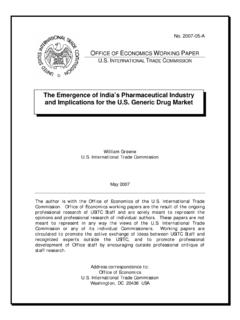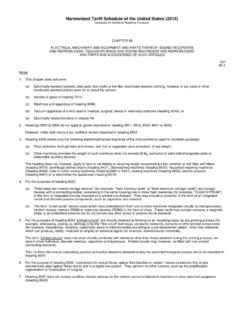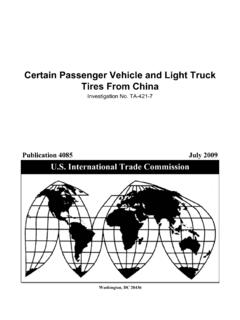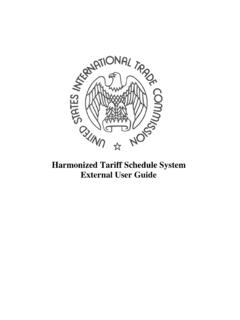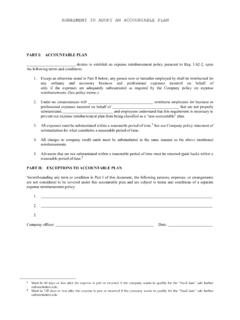Transcription of The Antigua-United States Online Gambling Dispute
1 1 The Antigua-United States Online Gambling Dispute Web version: July 2009 Author: Isaac Wohl1 Abstract During the last decade, Online Gambling grew in popularity while complex and overlapping Gambling laws in the United States left its legal status ambiguous. The United States efforts to prosecute foreign-based suppliers of Online Gambling services prompted Antigua to file a complaint in the WTO, in which it claimed that the United States had violated its GATS commitment to free trade in recreational services. The WTO ultimately ruled in favor of Antigua and awarded Antigua the right to suspend $21 million annually in intellectual property rights held by firms.
2 This Dispute exemplifies the potential for market access commitments to have unexpected and undesirable consequences. The potential for suspending intellectual property rights as a retaliatory measure may increase the leverage of small countries in trade disputes with large countries, but the implementation and management of such a suspension may be difficult and costly. 1 Isaac Wohl is an International Trade Analyst in the Office of In-dustries. The views presented in this article are solely those of the author and do not neces-sarily represent the opinions of the International Trade Commission or any of its Com-missioners.
3 2 2 Cited in Kanigher, 2003. 3 The Gaming Club, , was the first Online casino. Overview The Online Gambling Dispute between Antigua and the United States illus-trates key issues in international trade, including the relationship between domestic legislation and international agreements, the potential for trade commitments to have unintended consequences, and the challenges facing small countries in disputes with large countries. And it has culminated in an intriguing and unintuitive decision: the World Trade Organization em-powered Antigua to suspend intellectual property rights held by firms.
4 In this article I survey the relevant background, outline the sequence of events in the Online Gambling Dispute , and discuss some of the issues raised by this case. Background Antigua and Barbuda are tropical Caribbean islands covering 443 square miles (about times the size of Washington, ) (CIA 2008). The two islands are organized as a single political entity, hereafter Antigua. Anti-gua s 2007 population was 69,500 persons, and its gross domestic product (GDP) adjusted for purchasing power parity (PPP) was $ billion, giving it a high GDP per capita by Caribbean standards (CIA 2008).
5 More than half of its GDP is generated by tourism, with one third of its tourists coming from the United States (CIA 2008). Since the late 1990s, companies based in Antigua have used Antigua s high-quality international fiber-optic cable connections to provide Gambling ser-vices over the Internet (Krebs 2003). The Online Gambling industry is the second-largest employer in Antigua after tourism; in 2001, there were 93 licensed Gambling organizations in Antigua employing 1,900 persons (Antiguan Directorate of Gaming ). Antigua s annual Online Gambling revenue peaked at $90 million in 1999 (Hansen 2006 ).
6 There are conflicting estimates of how much of this revenue came from gamblers in the United States , but Bear Stearns estimated that 60 percent of worldwide Online gam-bling revenues came from customers in Online Gambling is a relatively recent phenomenon (the first Internet ca-sino was launched in 1995) facilitated by the expansion and improvement of communications Internet betting parlors offer a nearly 3 unlimited volume of Gambling services at very high speeds to customers around the world. Gamblers typically upload funds to the Online Gambling Web sites via electronic payment services or wire transfers, play games ei-ther with each other (poker, sports betting) or against the house (blackjack, roulette), and withdraw any winnings by check or Online payment service.
7 Online casinos have many competitive advantages over traditional brick-and-mortar casinos: resort casinos incur construction costs of up to $300 million and generally operate with profit margins between 8 percent and 16 percent, while one representative Online casino (Internet Casinos Inc.) was developed for $ million, employs 17 persons, and averages a 24 percent profit margin (Kyros ). policymakers have several concerns about Online Gambling . Some object to Gambling in general, based on the need to protect the public from addictive behaviors that create negative externalities (such as bankruptcy) (Leach and Carruthers 2006 ).
8 These objections are heightened with respect to Online Gambling , which is believed to be dangerously available to chil-dren, as users often can place bets with only a credit card number. Online Gambling has become popular on college campuses, and the National Council on Problem Gambling estimates that 7 percent of college students who gamble Online become addicted (Hogan 2007). There are also con-cerns specific to offshore Online Gambling , including the prospect of crimi-nal organizations and terrorists using Gambling Web sites to launder money (Leach and Carruthers 2006 ).
9 4 Many countries, including the United States , have laws to control or pro-hibit Online Gambling (GAO 2002, 45). However, the borderlessness and anonymity of Online Gambling make it inherently difficult to regulate. For example, Internet Gambling sites can prevent banks from recognizing trans-actions as Gambling by disguising credit card transactions or using Online payment providers as intermediaries (GAO 2002, 21). Most Online Gambling companies are based in small countries (Antigua, Costa Rica, Malta, the Isle of Man, etc.) with limited ability or inclination to supervise the industry.
10 4 However, Gambling websites keep detailed records of every bet and some have ex-pressed willingness to share their records with regulators; see Kanigher. 4 Ambiguity in Gambling Laws The complexity of Gambling laws adds to the difficulty of managing Online Gambling . For one, there are overlapping federal and state regula-tions. States determine whether individuals are permitted to gamble, and whether Gambling businesses are permitted to operate, within their borders (GAO 2002, 3). (As of 2006 , 8 States Illinois, Indiana, Louisiana, Nevada, New Jersey, Oregon, South Dakota, and Wisconsin had specifically pro-hibited internet Gambling (Friedman and Cheng 2006 ).)
